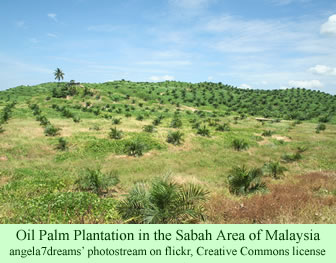Last week, Tok Batin Apong resented the manner of ten Perak State Forestry officials, who had come into his village to discuss the ways the Semai were using land in the Chikus Permanent Forest Reserve. The incident occurred at the Semai settlement in Sungai Manik, near the city of Teluk Intan, in Perak, Malaysia.
 Mr. Apong said that the forestry officials had approached the Semai to discuss the vegetables that were being grown in the forest reserve, as well as the large oil palm plantation that had been developed there.
Mr. Apong said that the forestry officials had approached the Semai to discuss the vegetables that were being grown in the forest reserve, as well as the large oil palm plantation that had been developed there.
Oil palm is arguably the world’s most productive vegetable, widely used for the manufacture of biofuels. For comparison, corn (maize) supplies about 172 liters of oil per hectare of corn crop per year, while oil palm produces almost 6,000 liters of crude oil per hectare. Palm oil is also used for food, as a base for cosmetics, and as an engine lubricant. Nearly half of the cultivated land in Malaysia is now devoted to oil palm plantations. The conversion of natural forest ecosystems into these plantations has become a major issue for environmentalists who are concerned about the loss of biodiversity in Southeast Asia.
But Mr. Apong focused on the manner of the forestry officers as well as the substance of their complaints. The officers were carrying firearms and handcuffs, he said. He told reporters, “they did not allow us to farm the area approved for planting herbs. We are forced to cultivate the area as there is no more farming area and [we] still need the forest to make a living.”
He went on to complain that the officers had prohibited the Orang Asli people from farming in the lowland reserve, but that they had permitted others to farm and grow ducks there. Apong said the officers were practicing favoritism.
A local politician, Datuk Zainol Padzi Paharuddin, informed of the incident last week, expressed surprise at the display of force by the forestry officers. He said “it was unnecessary.” He added that the government had in fact allowed the Semai to farm in part of the forest reserve.
Despite the approval at the state level, the Forestry Department apparently had decided to intervene, since that agency was encouraging scientific plant research in the Chikus Permanent Forest Reserve. The results of a study of forest soils in the reserve were just published this year. An inspection of the lowland dipterocarp forest by reporters showed that it had mostly been taken over by commercial interests.
The Forestry Department quickly responded on Thursday to the criticisms that had appeared in the news earlier that day. Datuk Nik Mohd Shah, Director of the Perak Forestry Department, said that a full report had been prepared about the illegal uses of the forest reserve, which have been going on for 20 years.
He said the report would be sent to the Perak Natural Resources and Environment Ministry and the Forestry Department of Malaysia. “We have a complete record of illegal settlers in the area and will submit it to the state government to make policies and find ways to resolve it,” he said.
He told the press that the large size of the Chikus reserve, about 2,500 hectares, and the fact that it is the only lowland forest preserve in the state, made it impossible to fence or regulate it from trespass and occupation. He advised local people to not attempt to move into the forest reserve, as he will “take stern action to curb this activity,” he said.
Regarding the statements to the press by the Semai, he said that they were allowed to depend on the forest for their living, but they were not permitted to cultivate the land or to cut down trees. He added that his officers were supplied with firearms for their own safety, and not to threaten or intimidate the Orang Asli people.
A follow up news report on Saturday indicated that the state is concerned about the oil palm plantations and plantings of cash crops such as guava, lime, and papaya. An officer had been dispatched to investigate. State officials believe that the massive oil palm plantations in the forest are the work of syndicates.